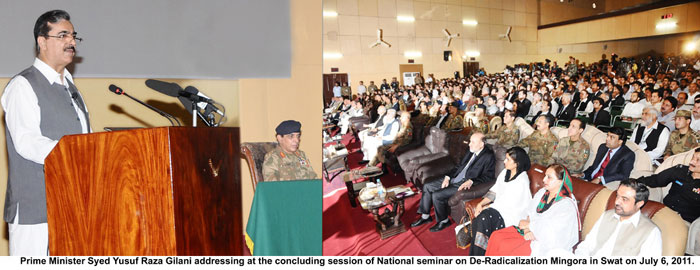People, state institutions to jointly eliminate terrorism; Gilani
SWAT, Jul 6 (APP): Prime Minister Syed Yusuf Raza Gilani on Wednesday vowed to eliminate terrorism from the country and said the people of Pakistan and the state institutions were united in their resolve to take this campaign to its logical end. “Pakistan’s commitment is total and unwavering. Despite the challenges, the political leadership, Parliament and other state institutions stand united for elimination of terrorism,” Gilani said in his address to the “National Seminar on De-radicalization”.The conference was also addressed by Chief of the Army Staff General Ashfaq Parvez Kiyani. Governor Khyber Pakhtunkhwa Barrister Masood Kosar and federal and provincial ministers were present at the seminar besides several foreign speakers.
The prime minister expressed the hope that “with collective support and struggle of the masses, political parties and military leadership, we will overcome extremism and terrorism.”
Prime Minister Gilani who flew into the picturesque valley on a day-long visit termed the war against extremism and terrorism as a matter of national survival.
Prime Minister Gilani said Pakistan shares global concerns about extremism, militancy and terrorism and dilated in detail on the geo-strategic environment, the challenges and the way forward towards an enduring national policy and strategy.
The Prime Minister said the country faced several challenges in its fight against terrorism and called for recognition of its efforts in political and military domain for combating terrorism at international level.
“There is a need to bridge trust deficit and allow Pakistan space to maneuver and contribute significantly without international pressure,” he said.
Gilani said cooperation in counter-terrorism warrants a partnership approach which fully accommodates others’ interests and “respect for the clearly stipulated Red Lines.”
“Drone attacks inside our boarders are in conflict with the ground realities, impacting negatively on our efforts in controlling radical trends,” the prime minister said.
He said sustainable success would come from promoting socio-economic development and resolving long standing political disputes.
The global resolve should manifest commitment in addressing the root causes that militants exploit as psychological tools.
He said working out such a strategy calls for serious and enduring commitment amongst stakeholders.
“Pursuing narrow interests at the cost of coalition partners and aspirations of people will be self-defeating. Sovereignty and self-respect of partners is to be respected,” Gilani stressed.
Prime Minister Gilani said in the war against terrorism, the nation has made great sacrifices and achieved tremendous successes.
“We lost over 30,000 men, women and children and more than 5000 personnel of the security forces,” he said.
Gilani said the phenomenon of terrorism has not only created the law and order problem in the country but also cost the nation dearly in financial terms as economy has suffered a loss of billions of dollars as a consequence.
“We are aware that without an effective national strategy marked by de-radicalization, we will not succeed fully and comprehensively,” the prime minister said.
He said Pakistan, today, faces multi-dimensional challenges both at external and internal levels. He termed the challenge of “unintended radicalism” and consequent terrorism as complex and a real barrier to the common goal of peace and stability.
He said without a dispassionate strategy appraisal, the assessments and policy formulation on de-radicalization can go wrong.
The Prime Minister also spoke at length about Pakistan’s security paradigm that owes its genesis to traumatic events of United States’ led Afghan jihad, inept post-cold war handling of Afghanistan by the West, festering regional conflicts and post 9/11 war in Afghanistan.
“What we witness today is the consequence of history and has an internal, regional and global context.”
He said the prolonged struggle against USSR brought various Jihadi organizations from around the world under one umbrella and encouraged the radicalized ideas and mindsets. The concept of Jihad, hitherto responsibility of a state, was privatized and politicized. Consequently, Pakistan continues to suffer from its ramifications.
Post 9/11, Pakistan embarked upon a mission to eliminate terrorism and militancy from its soil.
He said Pakistan’s Armed Forces carried out successful operations in Swat, Malakand, South Waziristan, Mohmand and Bajaur Agencies against terrorists and militants, done with full support of the nation, and in accord with the political will, articulated by the parliament of Pakistan and a meeting of all political parties.
Gilani, while acknowledging the efforts of Pakistan Army in fighting terrorism and rehabilitation, noted that the army had again contributed immensely and provided a nucleus to build on, by fighting de-radicalization.
He said the Swat De-radicalization Programme was a model for other relevant organizations to learn from and replicate.
The prime minister said since 2008 Pakistan has taken a number of measures at different levels to fight terrorism, in line with the country’s national interest.
“We are working closely with our global partners to fight terrorist groups and are determined not to allow use of our soil for terrorist activities against anyone,” he added.
He said regionally Pakistan was committed to working in unison with all neighbours for establishment of peace and elimination of terrorism.
He pointed that a stable united, friendly and peaceful Afghanistan was in Pakistan’s best interest and pointed that Pakistan wants independent and sovereign Afghanistan without any external influence.
Gilani said Pakistan views India as most important neighbour and desires sustained, substantive and result-oriented process of dialogue to resolve all outstanding issues including the core issue of Jammu and Kashmir.
“We sincerely hope that ongoing process of comprehensive engagement will be fruitful. Pakistan would like to resolve all outstanding issues with India in a peaceful and just manner.”
He however said that India will have to play a more positive and accommodating role and respond to Pakistan’s legitimate security concerns.
“India will not find Pakistan lacking in will to write a new chapter in our bilateral relations,” he added.
At the internal front, Gilani said Pakistan’s Counter Terrorism Strategy was home-grown and indigenous in character and was based on dictates of environment.
“We are following a “4-D strategy” - Dialogue, Deterrence, Development and Defeating the Terrorist’s ideology and mindset.
He said Pakistan has come a long way from where it was in 2001-02. The government galvanized public support against terrorism and gave political ownership to the national struggle against terrorism.
He said the law enforcement operations conducted by the valiant security forces were a success in arresting militancy, being emulated in Afghanistan as well as elsewhere.
He said elimination of radical threat in Swat, once propagated in global media as hub of terrorists, was a significant success and added it includes return and rehabilitation of 2.4 million displaced people in a record time.
“We banned organizations that fomented terrorism and sectarianism in the society. Efforts of our intelligence agencies have led to apprehensions of hundreds of Al-Qaeda operatives and targeting of their leadership.”
Gilani said a National Counter-Terrorism Authority (NACTA) was constituted in 2008 to create a database of terrorists and terrorist organizations and coordinate and exchange important information between the federal and provincial civilian agencies and security organizations.
He said process of de-radicalization of reconcilable detainees alone cannot pay the dividends unless the hardcore category of apprehended terrorists was awarded exemplary punishment through an appropriate judicial mechanism, and added that so far, such a legal framework was missing.
The Prime Minister said Anti-Terrorism Act promulgated essentially to tackle law and order situation.
He said that through elaborate and cooperative efforts of Federal Ministries of Law and Interior, the Chief Minister and the Governor of Khyber Pakhtunkhwa, a legal Framework Order has been prepared. He said the framework, endorsed by the President after approval of the Federal Cabinet, has become a law for FATA and PATA.
Gilani said in due course, it would be extended to the settled areas of Khyber Pakhtunkhwa and subsequently to entire Pakistan through acts of Provincial and National Assemblies respectively.
He said it provides answers to a host of questions starting from requisitioning process of Army in aid of civil power, prolonged detention of terrorists and most importantly, expeditious dispensation of justice.
Gilani said his government has taken concrete steps to enhance capacity building of para-military forces and police.
“We have set up community policing system for intelligence gathering and networking arrangement with NADRA to trace terrorists.”
He said Pakistan believes in democracy and pluralism. A society that strives for equality and dignity is undoubtedly essential for addressing the rage and anger arising from political or economic injustices.
“We acknowledge that without these steps, this rage will find new ways of expression.”
“Our government is committed to ensure improved access to physical assets, education, vocational skills, training and other education services that enhance human capital of the poor and enable them to generate better income through gainful employment opportunities,” the prime minister said.
The participants of the conference would share experiences on radicalization challenges and various de-radicalization models being followed in different parts of the world.
Gilani assured that the government would consider the recommendations in formulating its national response to the challenge.



 07-07-2011 11:15:12
|


